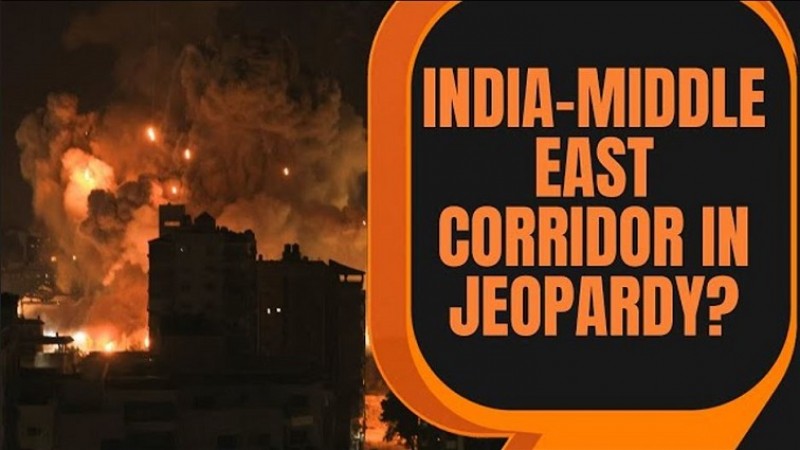
The persistent Israel-Hamas conflict has raised concerns about its potential repercussions on the India-Middle East-Europe Economic Corridor (IMEEC), according to the Global Trade Research Initiative (GTRI), a prominent think tank.
GTRI's analysis indicates that in the initial stages, the Israel-Hamas clash might primarily affect Israel and Gaza. However, if the conflict endures, its ripple effects are likely to extend across the entire Middle East, with potentially significant implications for the IMEEC.
One crucial consequence highlighted by GTRI is the possible hindrance of a groundbreaking peace agreement between Israel and Saudi Arabia, a development pivotal to the IMEEC framework.
"The ongoing Israel-Hamas conflict has the potential to disrupt the IMEEC's project timelines and anticipated outcomes, marking a critical juncture in the progress of this ambitious economic corridor. While the immediate impact remains regional, the geopolitical implications could resonate far and wide, ultimately affecting the proposed corridor," stated Ajay Srivastava, co-founder of GTRI.
All About the India-Middle East-Europe Economic Corridor (IMEEC)
IMEEC, a visionary economic corridor proposal, envisions a vast route connecting India to Europe, traversing through the United Arab Emirates, Saudi Arabia, Jordan, Israel, and Greece. Its primary objective is to establish links between India, the Gulf region, and a Northern Corridor that connects the Gulf to Europe.
The proposed corridor is set to include an extensive network of railways, ship-rail transit routes, and road transport networks.
The IMEEC gained substantial international support during the sidelines of the G20 Summit in India, with the signing of a Memorandum of Understanding (MOU) by India, the United States, Saudi Arabia, the United Arab Emirates, the European Union, Italy, France, and Germany.
The IMEEC, as a proposed economic corridor, seeks to stimulate economic development by promoting connectivity and economic integration among Asia, the Persian Gulf, and Europe.
Numerous international experts view the IMEEC as a response to China's Belt and Road Initiative. Union Minister Jitendra Singh, following the MOU signing, emphasized that the proposed corridor aims to "overcome obstacles arising from Pakistan's refusal to grant overland access and China's reported connectivity endeavors in the region."
PM Modi's Perspective on the India-Middle East-Europe Economic Corridor
Prime Minister Narendra Modi expressed his delight regarding the MOU signing for IMEEC, hailing the proposed corridor as a symbol of collaboration, innovation, and shared progress, representing a journey toward shared dreams and aspirations.
"Marking a path of shared dreams and aspirations, the India-Middle East-Europe Economic Corridor pledges to be a beacon of cooperation, innovation, and collective advancement. As history unfolds, may this corridor stand as a testament to human endeavor and unity spanning across continents," PM Modi posted on X.
Australia Cancels Repatriation Flights from Israel and Palestine
Air India Suspends Tel Aviv Flights Amid Israel-Hamas Conflict